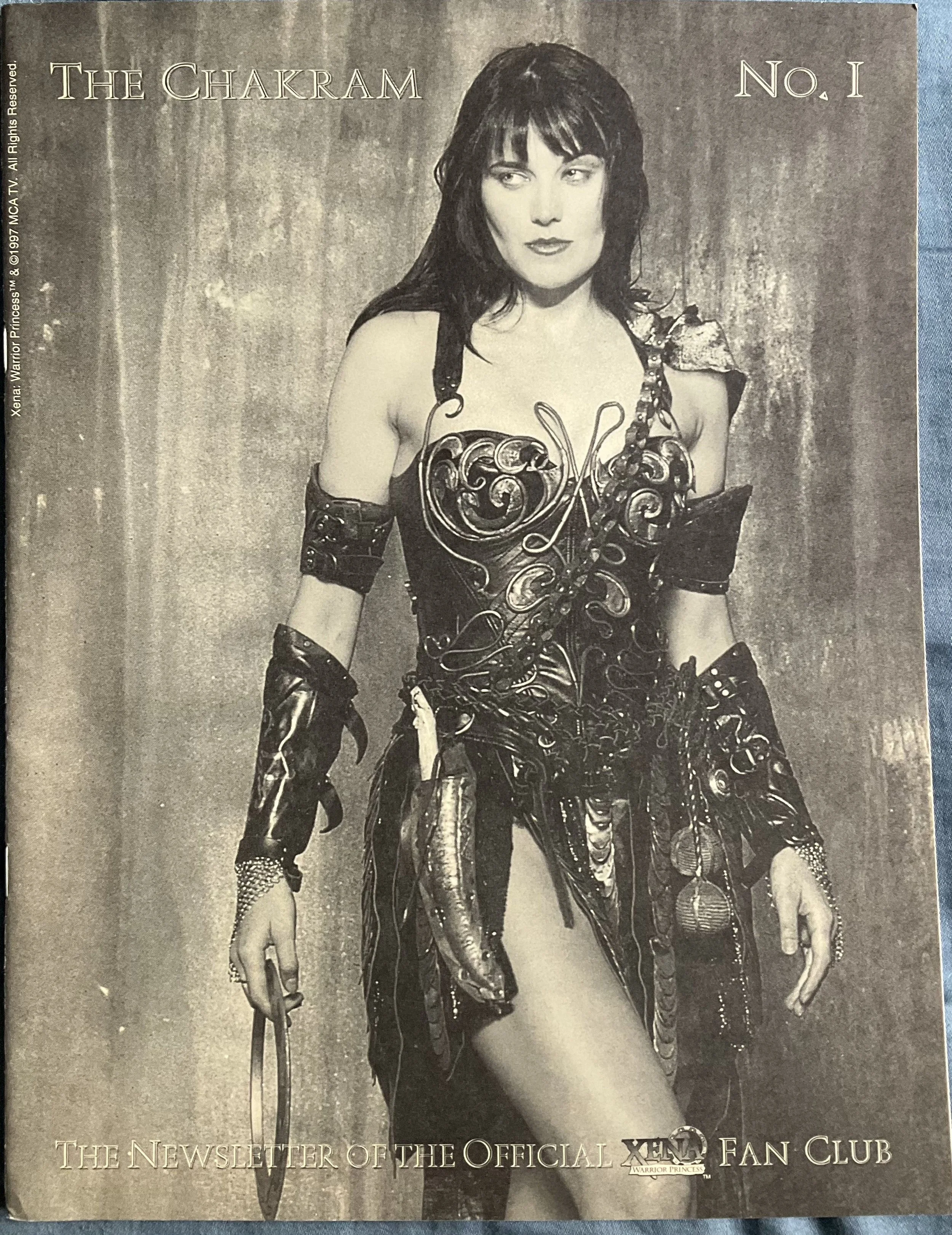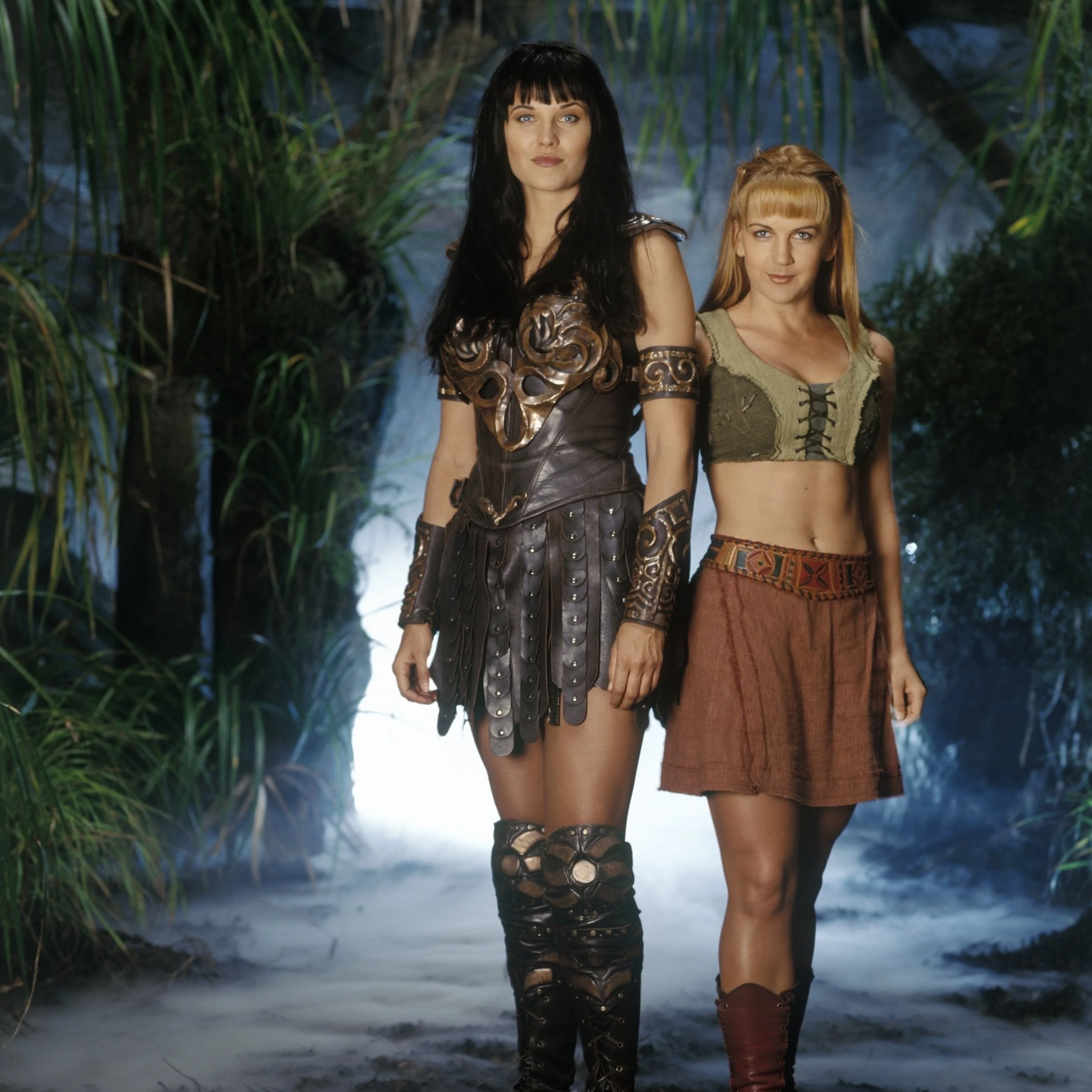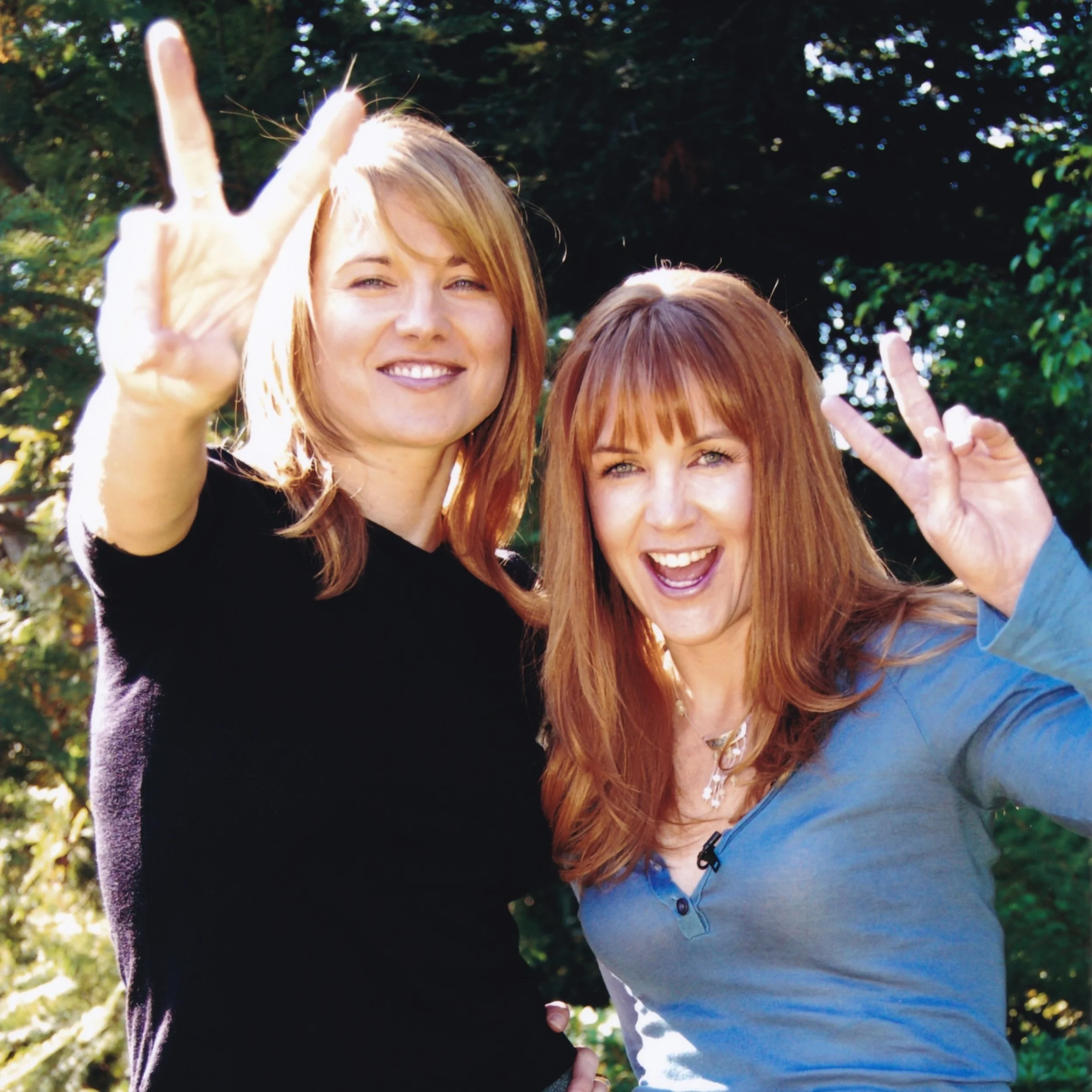Conversing with Lucy Lawless
A Fan Club Exclusive
Reported by Sharon Delaney
The Chakram Newsletter: Issue 01
My first phone interview with Lucy Lawless introduced me to an intelligent woman whose conversation ranged from “why I took up fire-breathing” to “how to get inside the mind of a murderer.”
The call to Lucy’s home in New Zealand took place Friday morning Los Angeles time, Saturday morning New Zealand time. They are one day ahead and three hours behind. Lucy was in her kitchen with daughter, Daisy, and one of her daughter’s friends. Daisy was on a 20-hour fast in support of World Vision. She was being sponsored by the Xena set. So our conversation was punctuated by the typical mother/daughter Saturday morning chatter.
Lucy had just come in. “I just got back from a morning walk. I’m starting to slow jog and use light weights.” Does she have any fears about getting back on Argo? “No, I’ll be riding her again soon.”
“Horsebackriding is the only (physical) thing I’ve ever had any natural ability at.” I asked if she had taken riding lessons when she was growing up. “No. I learned on the job.” She appeared in an episode of The Black Stallion called “Riding the Volcano” where she played a horse trainer.
I had read that she didn’t have much trouble with special effects because she had an active imagination. I wondered if she did much daydreaming as a child. “Yes, I did when I got to be alone. In a house with seven children, it was really a big deal to be alone.” Did she want to share some of her fantasies? “No, I’m sorry. I can’t tell you that,” she said, laughing.
Did being tall as a young girl play any part in her desire to act during her early years? I remember when I went to school the kids who were in the school plays were looked up to, they had a certain kind of mystique. “I really liked being tall. I was only ever the second tallest - any taller would have been uncomfortable.” We talked about the fact that in America, idols are easily made; even among children. In New Zealand you really have to prove yourself before anyone will take notice of you. “If anyone looked up to me,” she laughed, “they never told me about it.”
“My best friend was named Michele Spijkerbosch. I see her every now and again. She lived down the road from me. She would always hassle me about the fact that she could spell ‘graciously,’ and for some reason I always gave her that point. It seemed important that she had that point over me. (laughs) It was a real competition ender. Whatever we were scrapping about she would say, ‘So what, you can’t spell “graciously.”
“And that was the end of it. We were a year apart, but we were inseparable outside of school. We’d read fairy tales and then adapt them and my mother would take us up to the old people’s home. I can’t imagine what they thought. We were probably really crummy, but it was good practice for us.”
It was probably like watching their own kids.
“Yeah, right, cuz they wouldn’t see their own kids much.
At the convention she mentioned that it was easier being a tomboy growing up with four older brothers. She has said that her mom told her she didn’t know she was a girl until she was eight. And she was asked at the convention, “When you do all that masculine stuff in Xena does it make you feel more feminine in your real life?” She responded, “It has been a real journey to discover my femininity.” Was it her femininity she had trouble coming to terms with or the trappings of it?
“Yeah, the trappings were frightening. Somehow I equated femininity with wiliness and now I think it is not that. I avoided it at all costs - I didn’t even want to go near there. I think I probably hung about in neuter for a while,” she laughed.
Lucy never seems to be without a book by her bedside.
Growing up she “read things like Trixie Belden and someone else, I forget who, who as even more naff (nerdy).
In her recent AOL chat she mentioned she was reading “Cowboys Are My Weakness” by Pam Houston and “Voltaire’s Bastards (The Dictatorship of Reason in the West).” I couldn’t think of two more different books and asked what about the two of them caught her attention.
She was trying to understand the relationship between the public and the mass media. “I read the first three chapters of ‘Voltaire’s’ and didn’t agree with the chap who wrote it. So I lost interest. ‘Cowboys’ - oh, God, it’s beautiful.” Pam Houston wrote: “A man desires the satisfaction of his desire, a woman desires the condition of desiring.” “Right,” Lucy said, laughing. She also enjoyed Annie Proulx’ “Shipping News.” And her next book is “The Double Tongue” by William Golding who wrote “Lord of the Flies.” Down time on the set has become a favorite time to read.
I mentioned the influence her voice carried now that Xena was infiltrating American society. In a couple of early interviews she mentioned that the peace of anonymity in New Zealand had ended when the show began to air there. She told reporters, “It’s all over now, baby blue.” And everyone born in the 80s had no clue where that came from. It’s the title of a song by Bob Dylan. “Just an expression from my childhood.” I remember how the sales of “The Hobbit” jumped when Leonard said he was enjoying it. I can just see authors starting to send Lucy their works for review. Her name on a book jacket could send sales soaring. Lucy just chuckled at that scenario.
All seven of the Ryan children have scattered to different parts of the world and a wide variety of occupations. Of the two youngest, one wants to be an actor and the other, Daniel, a standup comedian. “He’s very funny.”
“I was raised to believe you can have anything you want if you’re prepared to work for it - absolutely anything you want.”
When you’re faced with something you’ve never done before and people are telling you, you can’t do it, how do you respond?
“I’ve had plenty of people that have told me I can’t do something. It just drove me underground - it just made me shut up and achieve very quietly - work even harder for it.”
I mentioned that, as far as we knew, she had a happy childhood with a good family and had never been a vicious warlord. But she said she believed some part of what makes someone a vicious warlord would have to be in her. “Acting is where you show hidden parts of yourself. I probably wouldn’t do the flips up the trees, although I sure would like to,” she laughed. “If I’d had a different set of conditioning I could have been that warlord.”
She’s been studying the differences between Eastern and Western cultures. “It’s not right to assume your way is the only way. Fifty percent of the world’s population can’t be entirely wrong.” We talked about the fact that it’s good to deal with the differences in people and not make them all the same. If you can understand them, it lessens the anger and frees you to have an open discussion about those differences. If an actress needs to pull strings of herself out in order to portray different people, different cultures, she needs to understand what makes them tick, learn to feel their feelings.
“I saw a piece about the last 10 minutes of a young man’s life before he was executed. He had committed a convenience store murder and he was sentenced to die. I was sympathizing with the young man and an actress on the set said she couldn’t feel sorry for him because she could never commit murder. I know that if the right circumstances occurred, I could kill. And I knew that she could never play a part like that because she couldn’t tap into that part of herself.”
As we continued talking, I mentioned that understanding her accent was a bit like talking to my Deaf friends. My sign language is pretty good, but my most used expression is “Sorry, missed that, repeat please.” But I didn’t want her to switch to American for me.
Lucy: “Are you sure”? Yeah, I said, laughing. I need the practice.
“Right. I remember talking to a physically handicapped person and he said that the hardest part was being ignored. As if he didn’t exist.” That’s all any minority wants, isn’t it, to be accepted.
And that applies to all parts of society. No one wants everyone to be the same, they all just want to be allowed to exist and not be told that their way doesn’t count. Whether it’s race, religion, nationality, physical ability, age, friendship, love.
Xena and Gabrielle are a perfect example of totally different attitudes, experiences, upbringing and way of looking at the world. And they accept each other’s differences and are learning from each other.
“This is a loving relationship between two human beings and it doesn’t need to be labeled.”
People are always trying to put love in boxes. Love shouldn’t have restrictions. Take it where you can find it. It’s too hard to find.
“That’s it.
Compared to a lot of people who have sedentary jobs, her work involves a lot of physical activity under the guise of anger and violence. (Lucy lauhs)
Does she get any sort of cathartic release from this? Bopping people over the head with frying pans?
“I don’t think I’ve picked a fight with anybody in years!” she said, continuing to laugh. “I don’t have a calm temperament so I guess it does act as a release valve. I try not to spread misery. You know, if I’m having a bad day, I try not to make it everybody else’s bad day. It’s really important in my position not to - in fact, it’s my job to keep things light on the set because I want to make it an easy place for everyone to be. And I love them so it’s not a trial.”
Can people tell when she’s really angry?
“I’m not shy about saying it. I try to be constructive, but I generally don’t get angry at people. I’m not afraid of angry people cuz I’ve been ‘em all,” she laughs. “I’ve been angry myself and they don’t frighten me.”
Anger frightens a lot of people.
“Yes, it does, but it doesn’t bother me at all.”
“I brought up the fire-branding bit she does. Why does she do that? Did anyone try to talk her out of it?”
“It’s a cool gag (stunt). One of the stunt men was injured once. Each time before we do it, a professional comes in and tests the stuff. But once the octane was too high and his face caught fire. He’s okay but it made me very conscious of making sure I follow the rules. I blow out totally and put a towel to my mouth before I take a breath in. I use milk to coat the membranes of my mouth and stomach.
“I don’t do it every day. And I don’t try to do anything fancy,” she laughed. As if it wasn’t fancy enough just as it is! People can see there are no cuts and that she’s really doing it herself.
“It’s important that it’s not all done in the editing room. You people want to see the character doing it.” Editing has made for some very fine performances, but “I don’t want it to be me that has the benefit of that sort of thing.”
She has said that her style of acting is diametrically opposed to that of Renee’s. With Lucy’s admiration of actresses such as Susan Sarandon and Helen Mirren and Renee being described as an introspective actor, it seemed an odd statement. Especially when the result of their work together is so seamless. I wondered what her approach was and how she and Renee have accommodated each other since the series began.
“Everything’s born out of Stanislavsky and infused with a bit of Meisner. But it doesn’t matter how you get there as long as you get to a point of listening and breathing the other character - you should be listening at every moment. Over the last two years we’ve become much closer. We have a really good working relationship. We’ve learned from each other. And the result is on the screen.”
I bring up the campfire scene in “Callisto.” I’m curious about the details and complexities of Lucy and Renee’s performances in this most famous and often discussed moment in the show. The intense emotion. Xena pulling Gabrielle’s head to her shoulder. The script doesn’t say, “Xena and Gabrielle cry,” yet both characters’ voices are clearly choked with emotion and Gabrielle sees Xena cry for the first time. The strange smile/laugh in the middle of the scene and Gabrielle’s wiping away of the tears from Xena’s cheek. I’m fascinated to know how all these pieces came together.
Lucy will not be drawn on this subject. Sometimes you can learn more than is good for you. After repeated viewings this scene still has a powerful impact on me and I realize I really don’t want to draw the curtain and expose the Wizard of Oz.
I’d noticed a change in Xena’s voice from the first Hercules movie to season one and again in season two. It seemed to be getting lower and the rhythm more deliberate. Was that a conscious decision?
“Well, initially it was. All those little things can help enhance a character. You would have seen a lot of things different in the trilogy cuz I was just winging it, really. I would have been working on developing a character from the start but becoming more comfortable by the end of trilogy.”
The Xena we know now has a sensitive, caring, compassionate side to her. As Xena, Destroyer of Nations, she had to have totally buried that part of her. What kind of emotional changes has Xena gone through since the show started?
“I think in the past she was instinctive and relied on that. It’s the sensitive side of her that’s been quashed for too many years because it would have told her too many home truths.”
What do you think Xena fears?
“Herself… love… a fear of accepting love.”
You’ve talked about being aware of your mortality since you were a child because of your Catholic upbringing. Do you think Xena is aware of hers?
“I think she knows that people in her line of work don’t live very long.”
It took me a moment to digest that stunning revelation, but she was right! In Xena’s line of work this was practically a given. However, the death of a character I’d just met and was enjoying so much was not something I wanted to contemplate. But Lucy’s immediate response to the question lead me to believe that this was something she had thought about. And I found myself saying, “Seems like that could also apply to the acting life of an actress” Her response: “I intend to stay in this business a long time.” Go girl! I thought.
“I don’t like to give too much of Xena’s inner feelings away - it would spoil the mystique. And we have so many things yet to discover about her.”
Does she think if Xena were a real person she would be friends with her?
“Yeah - we’d just sit there in each others’ company and not say a word to each other all day and be really good friends,” she said with a smile in her voice.
Of course I was curious if she would tell me anything about upcoming shows. So I asked, “Any hints?” (leaning forward eagerly with ears wide open.)
“There’s an episode coming up called ‘The Price.’”
Yes…
“And just for a moment some people may really, really hate Xena.”
And…
“Or they may really, really hate Gabrielle.”
And… (practically falling off the sofa.)
Silence.
That’s all you’re going to tell me, isn’t it.
Silence.
Sigh.
As I looked down at my watch, I realized our time was up. There was one final thing I wanted to tell her. In “A Day in The Life,” the image of Xena sitting next to Gabrielle with her dirty feet propped on a log and that huge grin on her face (Lucy starts laughing) - at the same time when in the middle of the fishing she became all business noticing the army’s trail then right back to the glee of throwing the eel in Gabrielle’s face (more laughter) - that made Xena, warlord and mischievous imp, totally believable to me. It was a perfect blending of those two parts of Xena’s character.
And with that, my time with Lucy Lawless, mischievous imp and actress, ends with the sound of her laughter the last thing I hear.
(Phone interview to New Zealand 3/14/97)


